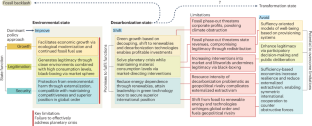脱碳状态的结构限制
IF 27.1
1区 地球科学
Q1 ENVIRONMENTAL SCIENCES
引用次数: 0
摘要
为了实现净零气候目标,许多州都加大了经济脱碳的雄心。尽管有这些愿望,新兴的脱碳国家在雄心勃勃的目标和实际政策之间面临着严重的实施差距,气候倒退的压力加剧了这一差距。我们认为,对自由资本主义国家的普遍模式及其基本功能(即确保经济增长、维护合法性和提供安全)的更深入理解可以帮助解释这一差距。我们将新生的脱碳状态概念化为越来越多的目标是从化石燃料转向可再生能源,而不仅仅是改进现有技术。然而,国家的这种转变挑战了自由资本主义国家模式的基本功能。我们的分析为未来的研究提供了分析和规范的途径。本文章由计算机程序翻译,如有差异,请以英文原文为准。


Structural limitations of the decarbonization state
To achieve net-zero climate targets, many states have ramped up ambitions to decarbonize their economies. Despite these aspirations, the emerging decarbonization state faces a serious implementation gap between ambitious targets and actual policies, intensified by climate backsliding pressure. We argue that a deeper understanding of the prevalent model of the liberal capitalist state and its basic functions (that is, ensuring economic growth, maintaining legitimacy and providing security) can help to explain this gap. We conceptualize the nascent decarbonization state as increasingly aiming to shift from fossil fuels towards renewable energy rather than merely improving existing technologies. This transformation of the state, however, challenges basic functions of the underlying liberal capitalist state model. Our analysis implies analytical and normative avenues for future research. The implementation gap between national climate targets and actual policies has been seen as a main barrier for decarbonization. Here researchers show it is rooted in the structural limitation of states and discuss future research directions to promote the emergence of transformative states.
求助全文
通过发布文献求助,成功后即可免费获取论文全文。
去求助
来源期刊

Nature Climate Change
ENVIRONMENTAL SCIENCES-METEOROLOGY & ATMOSPHERIC SCIENCES
CiteScore
40.30
自引率
1.60%
发文量
267
审稿时长
4-8 weeks
期刊介绍:
Nature Climate Change is dedicated to addressing the scientific challenge of understanding Earth's changing climate and its societal implications. As a monthly journal, it publishes significant and cutting-edge research on the nature, causes, and impacts of global climate change, as well as its implications for the economy, policy, and the world at large.
The journal publishes original research spanning the natural and social sciences, synthesizing interdisciplinary research to provide a comprehensive understanding of climate change. It upholds the high standards set by all Nature-branded journals, ensuring top-tier original research through a fair and rigorous review process, broad readership access, high standards of copy editing and production, rapid publication, and independence from academic societies and other vested interests.
Nature Climate Change serves as a platform for discussion among experts, publishing opinion, analysis, and review articles. It also features Research Highlights to highlight important developments in the field and original reporting from renowned science journalists in the form of feature articles.
Topics covered in the journal include adaptation, atmospheric science, ecology, economics, energy, impacts and vulnerability, mitigation, oceanography, policy, sociology, and sustainability, among others.
 求助内容:
求助内容: 应助结果提醒方式:
应助结果提醒方式:


